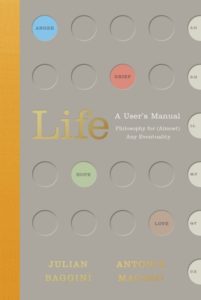„LIFE: A USER’S MANUAL” de Julian Baggini & Antonia Macaro
„Only a few generations ago, most people in the developed world had either fought in a war or knew someone who had.
Now war is something that many of us have never had to experience at all.”
………………………………………………………………
„As citizens, we have to ask ourselves: when should we support such military ventures and when should we do all we can to stop them?
Absolute pacifism provides a simple answer, but few are willing to say that a world without any killing at all is possible.
Even Ghandi, who promoted ahimsa (non-violence), accepted that pure pacifism was an ideal to be strived towards and not something that could ever be fully achieved:
<<Man cannot for a moment live without consciously or unconsciously committing outward himsa (violence).>>
Most people see war as a regrettable necessity.
Although the principles governing the ethics of war are contested, there has been remarkable agreement over the centuries about what has come to be called Just War Theory.
Although this has its origins way back in the Christian ethics of St. Augustine (354-430 CE), its modern versions are mostly secular.
Just War Theory is divided into two parts.
One concerns conduct in war (jus in bello), which in broad terms requires all warring parties to use proportionate force and to discriminate between combats and civilians. Most agree with these principles in theory, although they are often ignored in practice.
More fundamental is the ethics of going to war in the first place (jus ad bellum). Again the list of criteria is widely endorsed: the war must be waged for a just cause, it must be a last resort, it has to be declared by a proper authority, it has to have the right intention, it has to have a reasonable chance of success, and the scale of the fighting must be proportionate.”
……………………………………………………………………………………………………..
„Just War Theory does not provide an easy algorithm for determining whether conflict is justified, but it is useful as a set of tests and questions to help us to make the difficult judgements of war and peace.”
Publisher: Ebury Press, 2020
Julian Baggini and Antonia Macaro folosesc filozofia pentru a ne explica …VIAȚA, dar ne atenționează:
„Our users’ manual is not a set of instruction.
A traditional manual tells you how things work and what you have to do to fix them when they don’t. It is really a set of algorithms: linear, rule-based processes for solving problems.
No such algorithms exist for human life.
If they did, someone would have come up with them long ago and we’d all be getting on just fine.”


Recent Comments